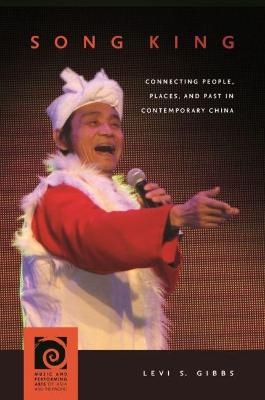
Song King
Connecting People, Places, and Past in Contemporary China
Seiten
2021
University of Hawai'i Press (Verlag)
978-0-8248-6991-5 (ISBN)
University of Hawai'i Press (Verlag)
978-0-8248-6991-5 (ISBN)
Examines the life and performances of ‘Folksong King of Western China’ Wang Xiangrong and explores how itinerant performers come to serve as representative symbols straddling different groups, connecting diverse audiences, and shifting between amorphous, place-based local, regional, and national identities.
When itinerant singers from China’s countryside become iconic artists, worlds collide. The lives and performances of these representative singers become sites for conversations between the rural and urban, local and national, folk and elite, and traditional and modern. In Song King: Connecting People, Places, and Past in Contemporary China, Levi S. Gibbs examines the life and performances of "Folksong King of Western China" Wang Xiangrong (b. 1952) and explores how itinerant performers come to serve as representative symbols straddling different groups, connecting diverse audiences, and shifting between amorphous, place-based local, regional, and national identities. Moving from place to place, these border walkers embody connections between a range of localities, presenting audiences with traditional, modern, rural, and urban identities among which to continually reposition themselves in an evolving world.
Born in a small mountain village near the intersection of the Great Wall and the Yellow River in a border region with a rich history of migration, Wang Xiangrong was exposed to a wide range of songs as a child. The songs of Wang’s youth prepared him to create a repertoire of region-representing pieces and mediate between regions, nations, and multinational corporations in national and international performances. During the course of a career that included meeting Deng Xiaoping in 1980 and running with the Olympic torch in 2008, Wang’s life, songs, and performances have come to highlight various facets of social identity in contemporary China. Drawing on extensive fieldwork with Wang and other professional folksingers from northern Shaanxi province at weddings, Chinese New Year galas, business openings, and Christmas concerts, Song King argues that songs act as public conversations people can join in on. As song kings and queens fuse personal and collective narratives in performances of iconic songs, they provide audiences with compelling models for socializing personal experience, negotiating a sense of self and group in an ever-changing world.
When itinerant singers from China’s countryside become iconic artists, worlds collide. The lives and performances of these representative singers become sites for conversations between the rural and urban, local and national, folk and elite, and traditional and modern. In Song King: Connecting People, Places, and Past in Contemporary China, Levi S. Gibbs examines the life and performances of "Folksong King of Western China" Wang Xiangrong (b. 1952) and explores how itinerant performers come to serve as representative symbols straddling different groups, connecting diverse audiences, and shifting between amorphous, place-based local, regional, and national identities. Moving from place to place, these border walkers embody connections between a range of localities, presenting audiences with traditional, modern, rural, and urban identities among which to continually reposition themselves in an evolving world.
Born in a small mountain village near the intersection of the Great Wall and the Yellow River in a border region with a rich history of migration, Wang Xiangrong was exposed to a wide range of songs as a child. The songs of Wang’s youth prepared him to create a repertoire of region-representing pieces and mediate between regions, nations, and multinational corporations in national and international performances. During the course of a career that included meeting Deng Xiaoping in 1980 and running with the Olympic torch in 2008, Wang’s life, songs, and performances have come to highlight various facets of social identity in contemporary China. Drawing on extensive fieldwork with Wang and other professional folksingers from northern Shaanxi province at weddings, Chinese New Year galas, business openings, and Christmas concerts, Song King argues that songs act as public conversations people can join in on. As song kings and queens fuse personal and collective narratives in performances of iconic songs, they provide audiences with compelling models for socializing personal experience, negotiating a sense of self and group in an ever-changing world.
Levi S. Gibbs is assistant professor of Chinese in the Department of Asian and Middle Eastern Languages and Literatures at Dartmouth College. Frederick Lau is the chair and professor of ethnomusicology and director of the Center for Chinese Studies at the University of Hawai‘i at Mānoa.
| Erscheinungsdatum | 01.12.2021 |
|---|---|
| Reihe/Serie | Music and Performing Arts of Asia and the Pacific |
| Zusatzinfo | 28 b&w illustrations, 1 map |
| Verlagsort | Honolulu, HI |
| Sprache | englisch |
| Maße | 152 x 229 mm |
| Gewicht | 470 g |
| Themenwelt | Literatur ► Biografien / Erfahrungsberichte |
| Kunst / Musik / Theater ► Musik ► Musiktheorie / Musiklehre | |
| Sachbuch/Ratgeber ► Geschichte / Politik | |
| Sozialwissenschaften ► Ethnologie | |
| Sozialwissenschaften ► Soziologie | |
| ISBN-10 | 0-8248-6991-5 / 0824869915 |
| ISBN-13 | 978-0-8248-6991-5 / 9780824869915 |
| Zustand | Neuware |
| Informationen gemäß Produktsicherheitsverordnung (GPSR) | |
| Haben Sie eine Frage zum Produkt? |
Mehr entdecken
aus dem Bereich
aus dem Bereich
Grundbegriffe, Harmonik, Formen, Instrumente
Buch | Softcover (2021)
Philipp Reclam (Verlag)
CHF 12,90


